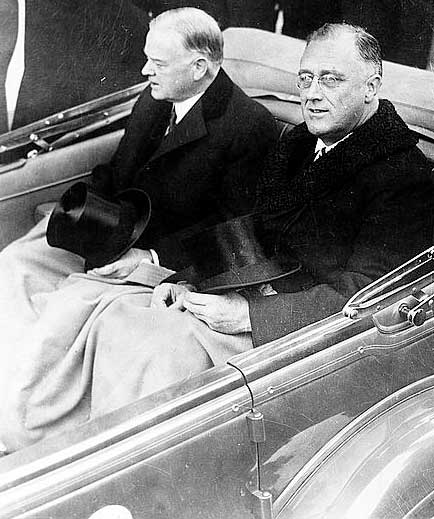FDR and the Election of 1932

FDR with Hoover in car
Franklin Roosevelt's overwhelming reelection as Governor and his activist record made him the early favorite for the Democratic nomination. The major obstacle was the rule that Democratic candidates were required to receive 2/3 of the convention vote. Roosevelt succeeded in obtaining the two thirds necessary. He broke tradition by flying to the convention to accept the nomination. With the nation deep in a depression, Roosevelt's vigorous campaign was able to easily overwhelm Hoover. Roosevelt carried 42 states, well over Hoover's 6 states.
Franklin Roosevelt's overwhelming victory in his 1930 reelection campaign for Governor set the stage for his bid for the Presidency. Roosevelt and his aids immediately began to maneuver behind the scenes to gain Roosevelt the nomination. Louis Howe worked on the inside, while Jim Farely traveled the country attempting to garner support for Roosevelt. Franklin was the early favorite but due to the Democratic convention rules that a candidate needed to receive 2/3 of the votes at the convention, a lead was not enough.
On March 15, Governor Roosevelt officially announced that he was running for the Presidency. As the convention approached, Roosevelt clearly had the lead. His opponents included Al Smith, and James Garner of Texas. The key to securing a convention victory was winning the nomination on one of the first ballots. On June 30, the first votes were cast for the nomination. Roosevelt received 666 (1/2), Smith received 203 (3/4) and Garner received 90 (1/4.) It was an impressive showing for Roosevelt, but still 104 votes shy of the 2/3 needed. Finally, on the fourth ballot, after Garner was offered the vice presidential candidacy, Roosevelt won the nomination.
The next day, in a break with tradition, Roosevelt flew to Chicago to accept the nomination. Roosevelt engaged in a vigorous campaign, attacking the policies of the Hoover administration. The onset of the depression had made the Republican position almost untenable. They had taken responsibility for the prosperity, now it was hard to evade responsibility for the depression. Roosevelt's one area of weakness was the corruption of New York's Tammany political organization. Charges of corruption had been brought against New York City's Mayor, James Walker. Roosevelt personally conducted the hearing, and gained important support by virtue of his resourceful handling of the investigation.
Ultimately, the Depression insured Roosevelt's overwhelming victory over Hoover. Roosevelt successfully presented himself as a leader who could make things happen and bring about a new deal for the American people. The American people turned to him in their time of need.
 >
>